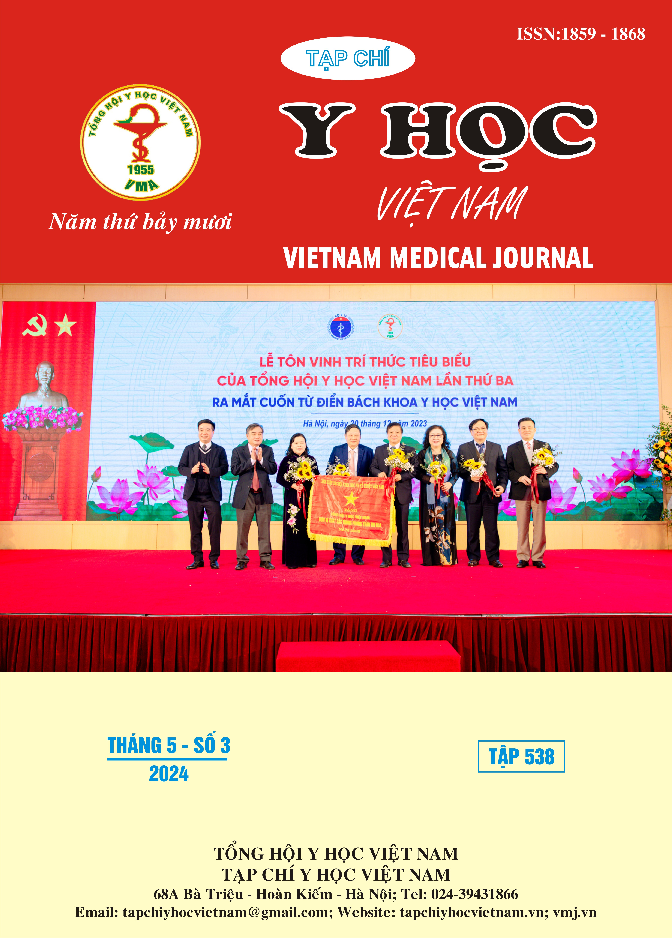THE RESULTS OF IMATINIB TREATMENT FOR GASTROINTESTINAL STROMAL TUMORS (GISTS) AT THE K HOSPITAL
Main Article Content
Abstract
Background: Gastrointestinal stromal tumour (GIST) is the most common mesenchymal tumour of the digestive tract, representing around 1% of all intestinal neoplasms1. Around 75%–80% of GISTs exhibit oncogenic KIT mutations2, and another 8%–10% exhibit platelet-derived growth factor receptor alpha (PDGFRA) mutations3. Currently, imatinib is the standard first-line therapy for patients with advanced/metastatic GIST4. Objectives: To describe some clincal and paraclincal features and treatment outcomes of gastrointestinal stromal tumour with Imatinib. Subjects and Methods: A descriptive study was conducted in 36 patients treated with imatinib at National cancer hospital. Results: 36 patients were identified with mean age of 57.83 years. Regarding mutational status, 20 patients (55.56 %) had a KIT exon 11 mutation, 3 had KIT exon 9 mutation (8.33 %), 1 with a PDGFRA mutation (2.78%). 12 patients were wild type for KIT and PDGFRA (5 patients were tested using blood samples). 88.89% (32 pts) received imatinib 400mg/day and the remaining received 800mg/day as first line treatment. In a total of 36 patients participating in the study, complete response rate was 5.56%, partial response (PR) rate was 44.44%; disease control rate (DCR) was 94.44%. Most common side effects included eyelid edema, fatigue and nausea.The incidence of grade 3-4 was relatively low. Conclusions: Imatinib is the mainstay treatment in the management of advanced/ metastatic GISTs. Ours study demonstrates significant response rates with acceptable adverse side effects.
Article Details
References
2. Hirota S, Isozaki K, Moriyama Y, et al. Gain-of-function mutations of c-kit in human gastrointestinal stromal tumors. Science. Jan 23 1998; 279 (5350):577-80. doi:10.1126/science.279. 5350.577
3. Heinrich MC, Corless CL, Duensing A, et al. PDGFRA activating mutations in gastrointestinal stromal tumors. Science. Jan 31 2003;299(5607): 708-10. doi:10.1126/science. 1079666
4. Verweij J, Casali PG, Zalcberg J, et al. Progression-free survival in gastrointestinal stromal tumours with high-dose imatinib: randomised trial. Lancet. Sep 25-Oct 1 2004; 364 (9440): 1127-34. doi:10.1016/S0140-6736(04) 17098-0
5. Kindblom LG, Remotti HE, Aldenborg F, Meis-Kindblom JM. Gastrointestinal pacemaker cell tumor (GIPACT): gastrointestinal stromal tumors show phenotypic characteristics of the interstitial cells of Cajal. Am J Pathol. May 1998; 152(5):1259-69.
6. Demetri GD, von Mehren M, Antonescu CR, et al. NCCN Task Force report: update on the management of patients with gastrointestinal stromal tumors. J Natl Compr Canc Netw. Apr 2010;8 Suppl 2(0 2):S1-41; quiz S42-4. doi: 10.6004/jnccn.2010.0116
7. Fletcher CD, Berman JJ, Corless C, et al. Diagnosis of gastrointestinal stromal tumors: A consensus approach. Hum Pathol. May 2002; 33(5): 459-65. doi:10.1053/hupa. 2002.123545
8. Diệp Bảo Tuấn. Nghiên cứu chẩn đoán và điều trị bướu mô đệm đường tiêu hóa. Tạp chí Ung thư học Việt Nam. 2016 2 (GIST)(7)


